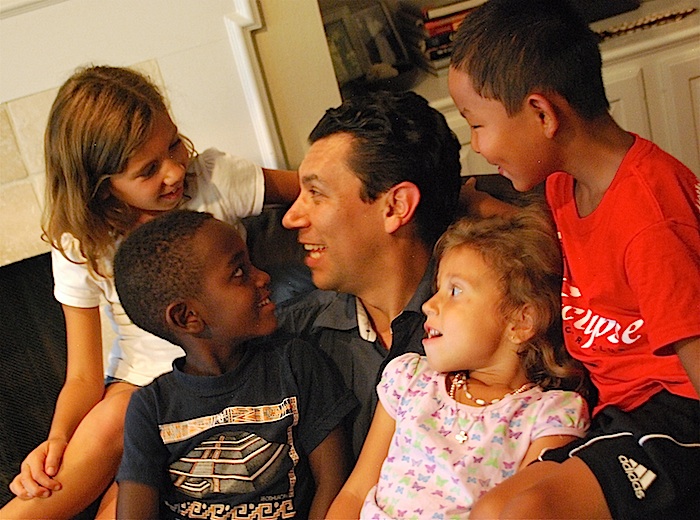On any given night, you will find my husband, Toño, narrating leyendas and mitos to our four children before putting them to bed: the history of the escudo on the Mexican flag, the story of the hare outsmarting the coyote, stories from the Bible, or even Aesop’s fables. La llorona, David and Goliath, and Juan Diego and la Vírgen de Guadalupe trump Goldilocks and Little Red Riding Hood when Papi tells — and acts out — these traditional stories.
Instead of choosing to read from books, my husband’s favorite way to calm the kids down is to snuggle on the couch and reveal detailed stories with strong characters, and always a moraleja (moral). Besides bonding with Papi and enriching their vocabulary, what I love about these nighttime sessions is that my kids are (subconsciously!) learning cultural nuances and values.
Toño’s not alone; Mexican culture (and Latin American culture in general) has a strong oral tradition. Unlike some cultures, who use stories in books as a way to teach literacy skills, often times traditional Latin culture will use storytelling for a different purpose. Older family members pass down morals, values and expectations, to the youngest listeners as they retell popular folklore. In my husband’s family, his dad used anecdotes and fables that his dad passed down to him to teach his children important values. Throughout the generations, families preserve cultural and family values and traditions as they tell how heroes and villains make their fateful decisions, allowing us to learn from their successes and mistakes.
Thousands of years ago — before there were written books available — every country of the world had tales of good versus evil, dramatic love stories, and overcoming oppression as components of their oral tradition. The stories served as inspiration, reinforced national identity, and taught important lessons to the youth.
Not only stories, but oral tradition also includes many aspects of folk culture: folktales, legends, corridos (stories put to music — such as Los Tigres del Norte’s songs of today), poetry, rhymes, riddles, refranes (proverbs), and even jokes! People enjoy repeating stories that teach their children cultural expectations. In the process, storytellers develop the creativity and communicative competence to turn storytelling into an art form.
In addition to folktales, my husband and his family pepper their conversation with jokes, refranes, and anecdotes of personal experience. These short, cultural sound bytes are a summary of popular wisdom that serve as helpful advice, given in a way that everyone can understand. Here are some dichos I have heard my husband use:
- Someone’s not paying attention and they miss their turn: “Camarón que se duerme, se lo lleva la corriente” (if you’re asleep or not paying attention, you’ll miss out; value: don’t be lazy).
- We forget something essential on a picnic or camping trip: “Hombre prevenido vale por dos” (you’ll be more effective if you plan; value: be prepared).
- The kids really wish we could get the latest Wii game: “A Dios rogando, y con el mazo dando” (instead of wishful thinking, work towards your goals; value: hard work).
- Your son didn’t get a turn at the game: “Al que no habla, Dios no lo oye” (similar to “the squeaky wheel gets the grease;” value: speak up for yourself).
- When our kids want to become better soccer players, better readers, or better at violin: “El que persevera, alcanza” (if you really want to achieve your goals, you need to try, and try again).
Whether you learn some Spanish folktales and dichos, or you simply share stories of your childhood, you can incorporate cultural lessons and pass on your family’s values to your children through oral tradition. Parents that spend time communicating with and engaging their children will reap immeasurable benefits: from improving their Spanish to guiding them to make better decisions.
But most of all, spending time together will create memories that they’ll remember when they gather their own children at night and continue these meaningful oral traditions.



This is an informative article, and has valuable advice for all parents. What a wonderful tradition!
Thank you! It was interesting how I became more aware of the tradition. I was preparing to do a diversity training at a local school, and stumbled upon an article about Latino parents and reading at home. It was talking about how different cultures view reading vs telling stories- a lightbulb went on in my head and I asked Tonio: “With all of your stories- are you telling them to teach the kids lessons?” “Yeah, of course. Why else would I be telling them stories?” Immediately it became clear why he doesn’t reach for a book, but instead just tells a story (frequently catering it to a current issue we are having:).
Does anyone have a good link/resource for some of these?
As a non-native speaker I grew up with a very different set of rhymes, legends, and such and my husband’s parents being very busy professionals they were not at all focused on passing traditions his way, so while we would like to incorporate some of these into our son’s storytime/bedtime routine we are not really able to do so.
Gracias!
Check out the book Pio Peep? (http://www.amazon.com/%C2%A1P%C3%ADo-Peep-Traditional-Spanish-Nursery/dp/0688160190)- it is filled with nursery rhymes and short sayings. Also here’s a wonderful list to check out from the library: http://www.learnnc.org/lp/pages/1913 that is categorized by age. You are in the same situation as I am (being a non-native speaker, and from a different culture) so we get to learn WITH our kids:).
Love the refranes! Although if my esposo ever uses “hombre prevenido…” with me, I may just combust!
Gracias for sharing this!
I know, right;)????
I love this blog post Becky! your husband is a superman~!! l would like to know more refranes and night time stories, I am tired of caperucita o los tres cochinitos! mil gracias